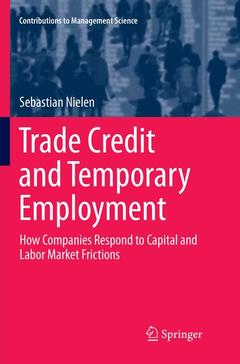Description
Trade Credit and Temporary Employment, 1st ed. 2016
How Companies Respond to Capital and Labor Market Frictions
Contributions to Management Science Series
Author: Nielen Sebastian
Language: English
Subjects for Trade Credit and Temporary Employment:
Trade Credit and Temporary Employment
Publication date: 04-2018
Support: Print on demand
Publication date: 04-2018
Support: Print on demand
Approximative price 52.74 €
In Print (Delivery period: 15 days).
Add to cart
Trade Credit and Temporary Employment
Publication date: 04-2016
Support: Print on demand
Publication date: 04-2016
Support: Print on demand
Description
/li>Contents
/li>Biography
/li>Comment
/li>
This book presents an empirical investigation into the relationship between companies' short-term response to capital and labor market frictions and performance. Two different kinds of performance measures are considered, namely innovation performance and firm performance. The author focuses on two major topics: first, on the relation between innovation performance and the use of trade credit. Second, on the relation between firm performance and the use of temporary employment. The use of in-depth firm-level data and state-of-the-art microeconometric methods provide the scientific rigor to this important investigation to answer the questions currently being confronted by many companies in different economies.
Introduction.- Product Innovation, Credit Constraints, and Trade Credit: Evidence from a Cross-Country Study.- Product Innovation and Trade Credit Demand and Supply: Evidence from European Countries.- Temporary Agency Work and Firm Competitiveness: Evidence from German manufacturing firms.- Productivity in German manufacturing firms: Does fixed-term employment matter?.- Summary and Future Research.
Dr. Sebastian Nielen studied Economics at the European University Viadrina in Frankfurt (Oder). Dr. Nielen holds a doctorate from the Schumpeter School of Business and Economics at the University of Wuppertal. Currently he is a researcher at the Institute for Applied Economic Research at the University of Tübingen, Germany.
Empirically investigates interrelationships between innovation, financing, and labor market developments
Uses a unique firm-level data to establish key empirical foundations to theory
One of the few in-depth studies in use of trade credit and temporary unemployment
© 2024 LAVOISIER S.A.S.




